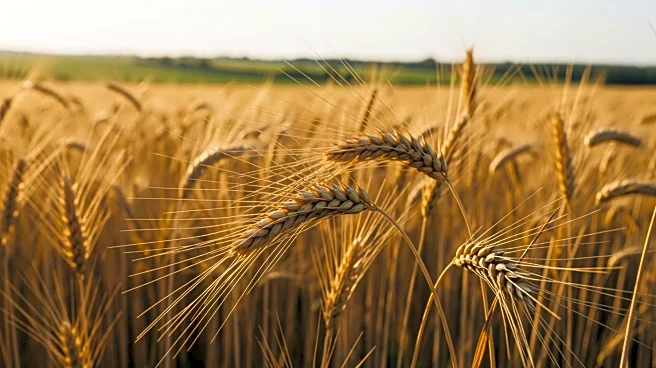What's Happening?
Brazil's agriculture market is forecasted to grow significantly, reaching USD 154.96 billion by 2030. This growth is driven by expanding crop output, strong export demand, and increasing digital adoption. The sector, valued at USD 128.60 billion in 2025,
is expected to grow at a compound annual growth rate (CAGR) of 3.80% from 2025 to 2030. Brazil's agricultural performance is shaped by rising global demand for soy and corn, increased cultivation in frontier regions, and the wider uptake of precision-farming tools. Export opportunities, particularly through Asian trade routes, continue to support farm revenues. However, challenges such as logistics costs and climate-related pressures persist. Government credit programs and private investments in agricultural technology are bolstering the market's long-term stability.
Why It's Important?
The projected growth of Brazil's agriculture market is significant for global food supply chains, particularly as Brazil is a major exporter of soybeans and corn. The expansion of Brazil's agricultural sector can help meet rising global food demands, especially in Asia, where import needs are increasing. The adoption of digital tools and precision farming can enhance efficiency and sustainability, potentially reducing waste and improving crop yields. However, logistical challenges and climate-related risks could impact Brazil's ability to maintain its competitive edge. The sector's growth also underscores the importance of government support and private investment in agricultural technology, which can drive innovation and resilience in the face of environmental and economic pressures.
What's Next?
Brazil's agriculture sector is likely to continue expanding its export markets, particularly in Asia, where demand for soybeans and corn is rising. The government may further enhance credit programs to support farmers, especially smaller producers, in adopting new technologies and improving efficiency. Investments in infrastructure, such as road and rail expansions, could alleviate logistical bottlenecks and reduce transport costs. Additionally, the sector may see increased adoption of digital tools and automation, improving farm management and productivity. Stakeholders will need to address climate-related risks and currency volatility to ensure sustainable growth.
Beyond the Headlines
The growth of Brazil's agriculture market could have broader implications for global trade dynamics, particularly in the agricultural sector. As Brazil strengthens its position as a key supplier, it may influence global commodity prices and trade policies. The increased use of digital tools and precision farming could set new standards for agricultural practices worldwide, promoting sustainability and efficiency. However, the sector's reliance on exports makes it vulnerable to geopolitical shifts and trade disputes, which could impact market stability. Additionally, climate change poses long-term risks that require proactive management to safeguard Brazil's agricultural productivity.















